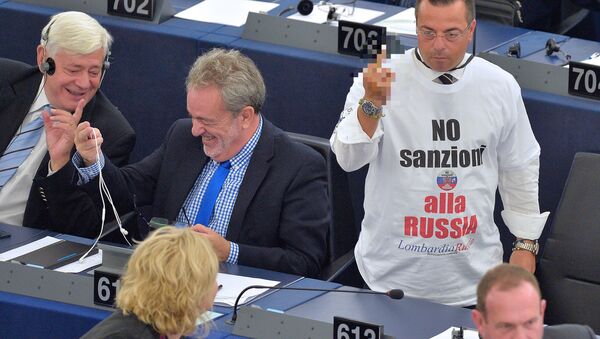MOSCOW (Sputnik) – Europe is becoming increasingly dissatisfied with the sanctions regime imposed against Russia over Moscow's alleged involvement in the Ukrainian crisis, Speaker of the Russian lower house of parliament (State Duma) Sergei Naryshkin said in an interview with the Izvestiya newspaper.
"We are not the ones to lift the so-called sanctions, because we were not the ones who imposed them. I can only confirm based on experience from meetings with foreign colleagues that discontent with the anti-Russian measures in Europe is growing," Naryshkin told the Russian newspaper on Thursday.
Last week, the Russian official met with a delegation of French parliamentary members, headed by Thierry Mariani. The group travelled to Crimea to meet local government officials in Yalta, Sevastopol and Simferopol.
Crimea, which has a predominately ethnically-Russian population, split from Ukraine to rejoin Russia in March 2014 after a referendum in which 96 percent backed the secession. Kiev and its Western allies labelled this move an "annexation."
Kiev and the West have also accused Moscow of being involved in the conflict between independence supporters in Ukraine’s southeastern regions of Donetsk and Lugansk and the new Ukrainian authorities, which came to power following a coup in February 2014.
The European Union, the United States and a number of their allies have imposed several rounds of sanctions against Russia over its alleged meddling in Ukraine’s internal affairs.
Russia has repeatedly denied the allegations, and has responded to sanctions with a one-year food import ban that was extended for one more year in June. The ban on imports of certain food products, including meat, dairy products, fruit and vegetables, from countries that have imposed sanctions against Russia, has been drawing increasing criticism from various EU industries.
According to a study released by the Austrian Institute of Economic Research last month, the European Union could lose up to $114 billion due to the anti-Russia sanctions if things remain unchanged.


